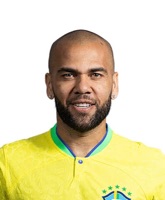
In February 2024, Barcelona legend Dani Alves was dragged out of the football pages and into the crime section. A Spanish court found him guilty of rape and handed him 4½ years in prison. Nigerians, as usual, had plenty of hot takes. Some shouted “serves him right!”, others whispered “the girl sef know wetin she dey do.”
Fast-forward to March 2025: appeal court overturns the conviction. Just like that. From “rapist” to “innocent again.” Nigerians are confused, angry, relieved, and entertained — all at the same time. Story no clear.
But this isn’t just about Alves. It’s about us. Nigerians love justice when it fits their mood, but we also side-eye the system because we know how our own works. In Nigeria, when the rich man is accused, people already believe the end of the story: money will move, case will die. Abroad, we expect “justice must be served!” So when Dani Alves walks free, it feels like Spain just gave us our own Nollywood plot twist.
This case touches three raw Nigerian nerves:
The Power of Celebrity – Nigerians worship football stars. Alves isn’t just some random defender; he’s the most decorated player in history. That kind of prestige makes people say, “E fit be lie o… this man too big for that kain thing.” Fame bends sympathy. The Gender Divide – Nigerian men and women don’t watch the same movie here. Many women see the case and think, “Classic example of men getting away with it.” Meanwhile, some men dismiss the woman’s testimony with, “Na set up. She wan chop him money.” This gap is wide, and it mirrors our everyday gender wars online. The Value of Evidence – In Spain, the court cited “reasonable doubt.” In Nigeria, our courts love adjournments, missing files, and “technicalities.” So we don’t even argue about doubt. We argue about whether justice can be bought.
What makes the Alves case so juicy for Nigerians is that it’s familiar yet far. It’s not about us, but it reflects us. It shows how fragile reputations are, how power bends truth, and how the line between victim and accused can blur in the public square.
At the end of the day, the Dani Alves story is not clear. Was he guilty? Was he innocent? Or was he just rich enough to bend the arc of justice? Nigerians will argue, laugh, and meme about it — because deep down, it mirrors the kind of society we live in: a place where the truth is often hidden behind money, status, and influence.
And that’s why this case feels so Nigerian, even though it happened in Spain.